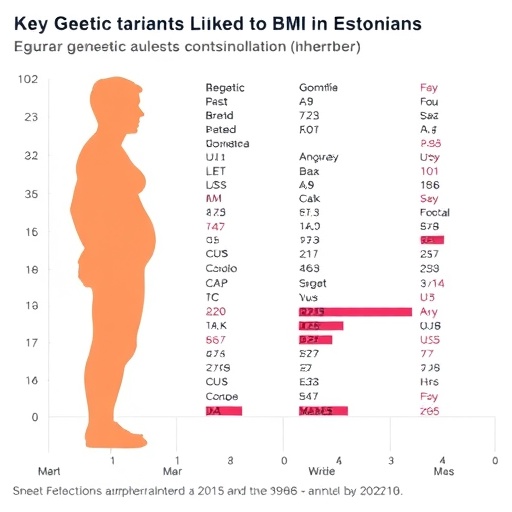In a groundbreaking study that has the potential to reshape our understanding of obesity and its genetic underpinnings, researchers from the Estonian Biobank have unveiled key genetic variants associated with body mass index (BMI). Published recently in Nature Communications, this comprehensive genome-wide association study (GWAS) leverages an extensive dataset from one of Europe’s most well-curated biobanks, shedding light on the intricate biological pathways influencing body weight regulation.
The Estonian Biobank, a national repository comprising genetic and health data from over 200,000 participants, provided a unique opportunity for scientists to explore BMI genetics with a high degree of precision and population specificity. By analyzing the aggregated genetic data, the team identified numerous prevalent variants that contribute to BMI variation, potentially offering novel targets for therapeutic interventions.
Body mass index, a widely used metric in public health to estimate an individual’s body fat, is influenced by a rich interplay of genetic, environmental, and lifestyle factors. While prior GWAS efforts have pinpointed hundreds of genetic loci associated with BMI—mostly in broadly defined populations—this study’s emphasis on the Estonian cohort uncovers population-specific variants that might have been underrepresented in earlier research, presenting new avenues to tailor obesity treatments.
Central to the findings is the identification of genetic variants clustered in loci related to neural pathways, energy metabolism, and adipose tissue function. The researchers found considerable enrichment of signals near genes involved in hypothalamic regulation of appetite, suggesting that central nervous system mechanisms play a pivotal role in the heritable component of BMI. This aligns with emerging perspectives that obesity is not solely a metabolic disorder but intricately linked to brain regulation.
Moreover, the study highlights the significance of genes implicated in lipid metabolism and mitochondrial function. These include pathways associated with fatty acid oxidation and energy expenditure, which are critical determinants of how efficiently the body processes and stores fat. Variations in these genes might influence individual susceptibility to obesity by modulating basal metabolic rates and energy homeostasis.
An intriguing aspect of this research is its focus on the interplay of pleiotropy, where single genetic variants exert effects on multiple traits beyond BMI, such as insulin resistance and cardiovascular risk factors. By leveraging cross-trait analyses, the team illustrated that certain variants not only predispose individuals to higher BMI but also to related metabolic disorders, reinforcing the importance of integrated genetic studies to untangle these complex relationships.
The methodological rigor of the study is noteworthy. Using high-density genotyping arrays combined with state-of-the-art imputation techniques enabled fine-mapping of loci with improved resolution. Further, functional annotation and gene-set enrichment analyses were employed to interpret the biological relevance of identified variants, moving beyond mere association towards mechanistic insights.
Beyond the academic implications, these discoveries have tangible relevance for public health. Understanding genetic susceptibility to obesity in specific populations can inform the design of precision medicine approaches, offering possibilities for targeted lifestyle interventions or pharmacological treatments that consider individual genetic makeup. This personalized dimension could substantially improve the effectiveness of obesity management.
The investigators also tackled the challenge of environmental confounders by incorporating comprehensive phenotypic data from the Estonian Biobank, which allowed for robust adjustment of lifestyle variables such as diet and physical activity. This strengthens the confidence that the detected genetic signals genuinely reflect hereditary influences, minimizing residual bias.
Notably, the Estonian cohort’s relatively homogeneous genetic background provided an advantage by reducing population stratification biases, a perennial challenge in GWAS. However, the researchers caution that replication in diverse cohorts remains essential to validate these findings and to examine their generalizability across global populations with varied ancestries.
The study further delves into sex-specific genetic effects, uncovering variants with differential influence on BMI between males and females. This adds yet another layer of complexity to the genetic landscape of obesity, suggesting that sex hormones and related biological pathways modulate genetic susceptibility.
Importantly, this research sets a precedent for future investigations by demonstrating the utility of national biobanks as powerful platforms for genomic epidemiology. As more countries develop comprehensive biobanking infrastructures, the integration of genetic and phenotypic data will accelerate discoveries, enhancing our grasp of multifactorial conditions like obesity.
Beyond the scientific community, these insights might reshape societal perceptions of obesity, emphasizing its roots in biology as well as lifestyle. Such understanding could reduce stigma and foster empathy, framing obesity as a complex health condition with genetic predispositions rather than a simplistic consequence of personal choices.
Looking forward, the study proposes follow-up functional assays to explore how the identified variants mechanistically influence gene expression and downstream metabolic processes. This integration of genomic data with functional biology will be crucial for translating genetic associations into therapeutics.
The Estonian Biobank team’s multi-disciplinary approach exemplifies the power of collaboration between geneticists, epidemiologists, bioinformaticians, and clinical researchers. This integrative strategy is vital to harness big data for meaningful biomedical insights, particularly in dissecting polygenic traits like BMI.
As obesity rates continue to climb globally, elucidating the genetic architecture underlying body weight regulation is paramount. This landmark study significantly advances that mission, laying a foundation for more nuanced risk prediction models and ultimately, more effective and personalized interventions to curb the obesity epidemic.
Subject of Research: Genetic variants associated with body mass index (BMI) in the Estonian population.
Article Title: Characterization of prevalent genetic variants in the Estonian Biobank body-mass index GWAS.
Article References:
Abner, E., Batool, K., Taba, N. et al. Characterization of prevalent genetic variants in the Estonian Biobank body-mass index GWAS. Nat Commun 16, 8956 (2025). https://doi.org/10.1038/s41467-025-64006-9
Image Credits: AI Generated
Tags: body mass index and geneticsenvironmental and lifestyle factors in obesityEstonian Biobank research studygenetic data analysis in health researchgenetic variants associated with BMIgenome-wide association study on BMInovel findings in obesity researchobesity genetics in Estoniansobesity treatment personalizationpopulation-specific genetic variantspublic health and BMItherapeutic targets for obesity





